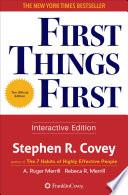Quotes from book
First Things First

First Things First is a self-help book written by Stephen Covey, A. Roger Merrill, and Rebecca R. Merrill. It offers a time management approach that, if established as a habit, is intended to help a person achieve "effectiveness" by aligning him- or herself to "First Things". The approach is a further development of the approach popularized in Covey's The Seven Habits of Highly Effective People and other titles.

“Trust is the glue that holds everything together.”
Source: First Things First (1994), p. 243 <!-- Originally added as a paraphrase : The moment of making choice is the moment of truth! -->
Context: Trust is the glue that holds everything together. It creates the environment in which all of the other elements — win-win stewardship agreements, self-directing individuals and teams, aligned structures and systems, and accountability — can flourish.

“Often we are so busy with sawing that we forget to sharpen the saw..”
First Things First (1994), Disputed

“Instead of looking at fragments, try to see the whole picture.”
First Things First (1994), Disputed

“There will be real happiness, peace of mind and balance, when living by heart and right-mindedly.”
First Things First (1994), Disputed

“Change happens at the speed of trust. (cf. The SPEED of Trust, 2008)”
First Things First (1994), Disputed

Source: First Things First (1994), p. 113
Context: It's not enough to have values without vision; you want to be good, but you want to be good for something. On the other hand, vision without values can create a Hitler. An empowering mission statement deals with both character and competence; what you want to be and what you want to do in your life.

Source: First Things First (1994), p. 12 <!-- Originally added as : Instead of taking two watches, take compass. It is not important how fast you are moving, but where you are moving. -->
Context: We present a dramatically different approach to time management. This is a principle-centered approach. It transcends the traditional prescriptions of faster, harder, smarter, and more. Rather than offering you another clock, this approach provides you with a compass — because more important than how fast you're going, is where you're headed.